Zondervan Theological Studies Collection (5 vols.)
Digital Logos Edition
Overview
The Trinity, atonement, Christology, and more—this collection explores fundamental Christian doctrines in light of our contemporary and global context.
In Christology, Ancient and Modern and Advancing Trinitarian Theology, Oliver Crisp and Fred Sanders present studies from the 2013 and 2014 Los Angeles Theology Conference, examining developments in how contemporary scholarship treats these two foundational doctrines. Then, considering Christianity’s explosive growth outside the Western world, Timothy C. Tennent examines how the theological work of the global South and East can help revitalize the universal truths of Christianity for Western Christians.
Jeremy R. Treat in The Crucified King demonstrates how kingdom and cross are inseparable—integrated in Scripture and theology. And finally, in A Theology of James, Peter, and Jude, Peter H. Davids explores how these letters relate to the broad picture of New Testament theology.

- Explores fundamental Christian doctrines in light of our contemporary and global context
- Considers how the theological work of the global South and East can revitalize Christian theology in the West
- Includes the proceedings from the 2013 and 2014 Los Angeles Theology Conferences
- Title: Zondervan Theological Studies Collection
- Publisher: Zondervan
- Volumes: 4
- Pages: 1,424
- Resource Type: Monographs, Collected Essays
- Topic: Theology
This title is included in the following collections
You can save when you purchase this product as part of a collection.
Zondervan Ultimate Collection ...
$21,970.44$16,474.99
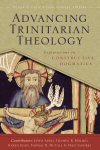
Throughout the last century theologians gave great attention to the doctrine of the Trinity, restoring it to a central place in Christian thought. But as they highlighted the novelty of a revolutionary “new trinitarianism,” a number of generalizations and simplifications crept into the discussion—a contrast between a supposed “Eastern” view versus a “Western” view, a social foundation for divine unity, and considerable scapegoating of major historical figures.
In this volume, contributors to the 2014 Los Angeles Theology Conference make constructive progress in the doctrine of the Trinity by highlighting the counter-revolutionary trends in the most recent trinitarian thought, and aligning the trinitarian revival with the ongoing task of retrieving the classical doctrine of the Trinity.
Oliver D. Crisp attended the Wimbledon School of Art and the University of Aberdeen before completing his PhD at King’s College, University of London. Crisp is the author of An American Augustinian: Sin and Salvation in the Dogmatic Theology of William G. T. Shedd and coeditor of Theology and Philosophy: Faith and Reason and Christianity and the Disciplines: The Transformation of the University. He has taught at the University of St. Andrews, the University of Notre Dame, and Regent College. He is currently a reader in theology at the University of Bristol.
Fred Sanders is associate professor of theology at Biola University’s Torrey Honors Institute. Sanders is the author of Wesley on the Christian Life: The Heart Renewed in Love and the coeditor of Jesus in Trinitarian Perspective: An Introductory Christology. A popular blogger and speaker, Sanders has authored numerous journal articles and written or contributed to several books, including The Image of the Immanent Trinity.
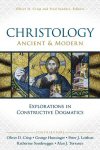
Christology was the central doctrine articulated by the early church councils, and it remains the subject of vigorous theological investigation today. The doctrine of Christ is a field of broad ecumenical convergence, inviting theologians from all denominational settings to fruitful collaborative exploration. In the contemporary setting, it is especially crucial for theologians to investigate the scriptural witness afresh, to retrieve classical criteria and categories from the tradition, and to consider the generative pressure of soteriology for Christology proper.
In these proceeding from the first Los Angeles Theology Conference, contributors make analyze contemporary dogmatics in intentional engagement with the Christian tradition. Christology, Ancient and Modern surveys the field and articulates the sources, norms, and criteria for constructive theological work in Christology.
Oliver D. Crisp attended the Wimbledon School of Art and the University of Aberdeen before completing his PhD at King’s College, University of London. Crisp is the author of An American Augustinian: Sin and Salvation in the Dogmatic Theology of William G. T. Shedd and coeditor of Theology and Philosophy: Faith and Reason and Christianity and the Disciplines: The Transformation of the University. He has taught at the University of St. Andrews, the University of Notre Dame, and Regent College. He is currently a reader in theology at the University of Bristol.
Fred Sanders is associate professor of theology at Biola University’s Torrey Honors Institute. Sanders is the author of Wesley on the Christian Life: The Heart Renewed in Love and the coeditor of Jesus in Trinitarian Perspective: An Introductory Christology. A popular blogger and speaker, Sanders has authored numerous journal articles and written or contributed to several books, including The Image of the Immanent Trinity.
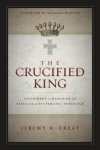
The kingdom of God and the atonement are two of the most important themes in all of Scripture. Jeremy R. Treat argues that, tragically, theologians have often either set the two at odds or focused on one to the complete neglect of the other.
The Crucified King reveals Scripture’s mutually enriching relationship between the kingdom and atonement, drawing from the story of Israel and culminates in the crucifixion of Christ the king. As Israel’s messiah, Christ holds together the kingdom and the cross by bringing God’s reign on earth through his atoning death. The kingdom is the ultimate goal of the cross, and the cross is the means by which the kingdom comes. Jesus’ death is not the failure of his messianic ministry, nor simply the prelude to his royal glory—it is the apex of his kingdom mission. The cross is the throne from which he rules and establishes his kingdom.
Using a holistic approach that brings together the insights of biblical and systematic theology, this book demonstrates not only that the kingdom and the cross are inseparable, but how they are integrated in Scripture and theology.
Jeremy R. Treat is a pastor at Reality LA in Hollywood, California and an adjunct professor at Biola University in La Mirada, California. Before earning his PhD in systematic theology from Wheaton College, Treat was a pastor for seven years in the Seattle area and earned degrees from Seattle Pacific University, Fuller Theological Seminary, and Trinity Evangelical Divinity School.
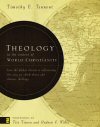
It’s no secret that the center of Christianity has shifted from the West to the global South and East. While the truths of the Christian faith are universal, new contexts bring new questions, new understandings, and new expressions. What does this mean for theology? Is the Christian faith not only culturally translatable, but also theologically translatable?
Timothy Tennent answers this question with a resounding yes. Theological reflection is alive and well in the majority world church, and these new perspectives need to be heard, considered, and brought into conversation with Western theologians. Global theology can make us aware of our own blind spots and biases. Because of its largely conservative stance, global theology has much to offer toward the revitalization of Western Christianity. Tennent examines traditional theological categories in conversation with theologians from across the globe, making this volume valuable for students, pastors, missionaries, and theologians alike.
Timothy C. Tennent is president of Asbury Theological Seminary in Wilmore, Kentucky. He is the author of Encountering Theology of Mission: Biblical Foundations, Historical Developments, and Contemporary Issues and Christianity at the Religious Roundtable.
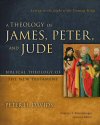
In this volume, Peter Davids offers a comprehensive study of James, 1 and 2 Peter, and Jude—books which are often insufficiently covered in more general New Testament introductions, theologies, and surveys. Before discussing a theology of each of the four letters, Davids first deals with their common aspects—their shared background in the Greco-Roman world and a similar Christology, view of the source of sin, and eschatology—thus justifying their being treated together. In the chapters that follow, Davids embarks upon a theological reading of each letter informed by its social-rhetorical understanding.
Peter H. Davids is professor of biblical theology at St. Stephen’s University, St. Stephen, New Brunswick. He is the author of the Pillar New Testament Commentary on 2 Peter and Jude, coauthor of Hard Sayings of the Bible, and the coeditor of Dictionary of the Later New Testament and Its Developments.